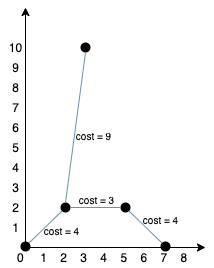1584. Min Cost to Connect All Points
You are given an array points representing integer coordinates of some points on a 2D-plane, where points[i] = [xi, yi].
The cost of connecting two points [xi, yi] and [xj, yj] is the manhattan distance between them: |xi - xj| + |yi - yj|, where |val| denotes the absolute value of val.
Return the minimum cost to make all points connected. All points are connected if there is exactly one simple path between any two points.
1
2
3
4
5
6
7
8
| Example 1:
Input: points = [[0,0],[2,2],[3,10],[5,2],[7,0]]
Output: 20
Explanation:
We can connect the points as shown above to get the minimum cost of 20.
Notice that there is a unique path between every pair of points.
|


1
2
3
4
| Example 2:
Input: points = [[3,12],[-2,5],[-4,1]]
Output: 18
|
1
2
3
4
| Example 3:
Input: points = [[0,0],[1,1],[1,0],[-1,1]]
Output: 4
|
1
2
3
4
| Example 4:
Input: points = [[-1000000,-1000000],[1000000,1000000]]
Output: 4000000
|
1
2
3
4
| Example 5:
Input: points = [[0,0]]
Output: 0
|
Constraints:
- 1 <= points.length <= 1000
- -106 <= xi, yi <= 106
- All pairs (xi, yi) are distinct.
Solution#
1
2
3
4
5
6
7
8
9
10
11
12
13
14
15
16
17
18
19
20
21
22
23
24
25
26
27
28
29
30
31
32
33
34
35
36
37
38
39
40
41
42
43
44
45
46
47
48
49
50
51
52
53
54
55
56
57
58
59
60
61
62
63
64
65
66
| class Solution {
int[] a;
public int minCostConnectPoints(int[][] points) {
int n = points.length;
a = new int[n];
for (int i = 0; i < n; i++) {
a[i] = i;
}
PriorityQueue<Edge> pq = new PriorityQueue<>();
for (int i = 0; i < n; i++) {
for (int j = 0; j < n; j++) {
if (i != j) {
int[] a = points[i];
int[] b = points[j];
int w = Math.abs(a[0] - b[0]) + Math.abs(a[1] - b[1]);
pq.add(new Edge(i, j, w));
}
}
}
int sum = 0;
while (pq.size() > 0) {
Edge e = pq.poll();
if (!same(e.a, e.b)) {
union(e.a, e.b);
sum += e.w;
}
}
return sum;
}
boolean same(int p, int q) {
return find(p) == find(q);
}
int find(int p) {
while (a[p] != p) {
p = a[p];
a[p] = a[a[p]];
}
return p;
}
void union(int p, int q) {
int pid = find(p);
int qid = find(q);
a[qid] = pid;
}
class Edge implements Comparable<Edge> {
int a;
int b;
int w;
public Edge(int a, int b, int w) {
this.a = a;
this.b = b;
this.w = w;
}
public int compareTo(Edge other) {
return Integer.compare(this.w, other.w);
}
}
}
|

